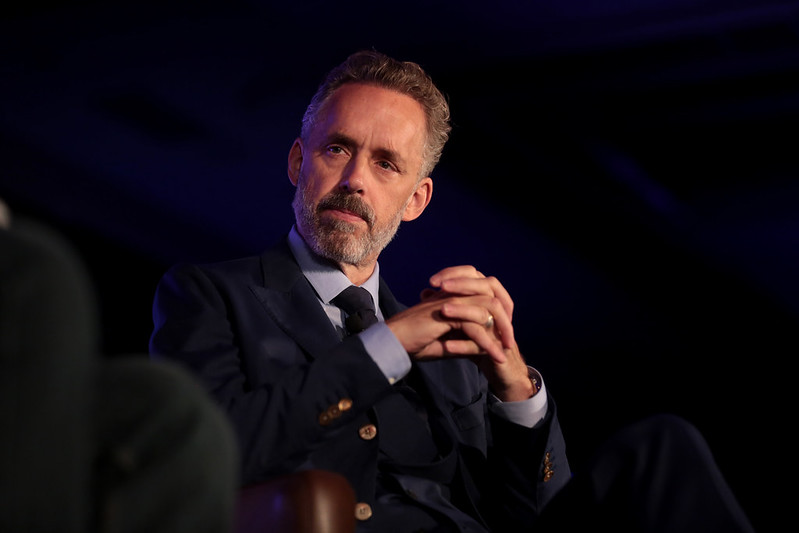Considering the guided exploration of healthy masculinities

Photo by Gage Skidmore via Flickr.
On Friday, May 19, I joined a room full of other patrons at the Unpacking Peterson Counter-Event in the David Lam Auditorium at UVic.
The event took place in response to Jordan Peterson’s live event “Beyond Order: 12 More Rules for Life Tour” which was being held simultaneously at the Save on Foods Memorial Centre in Victoria to promote his latest book.
The event, consisting of a panel of experts (of varying degrees) in areas of work or study relevant to the analysis of Jordan Peterson, began at 7:30 p.m., hosted by the Healthy Masculinity Collective.
I expected the evening to be an organized “unpacking” of Peterson’s complicated impact, but it erred more toward being a guided conversation around the generics of toxic masculinity, loosely applied to some of Peterson’s politics.
Peterson, a controversial public figure, began his career as a well-educated clinical psychologist and became, over a number of years, the author of many self-help books. These books have undoubtedly improved the mental health and quality of life for their readers.
However, his academic and professional credentials, more recently, have attributed a false degree of legitimacy to the bigoted opinions that he shares online.
One comment that went particularly viral, and is likely his best-known offense, was of transphobic nature toward actor Elliot Page. This singular affront, though, does not scratch the surface of the harm that Peterson’s rhetoric has inflicted on vulnerable groups; as the New York Times even declared him a “custodian of the patriarchy.”
The defence of Peterson, which is vicious and ample, often weaponizes academia by conflating his high level of education in specific fields of study to general scholarly expertise.
The trouble with Peterson is that a bestseller and a PhD don’t create a somehow legitimate basis for hate speech. They only create a dichotomy of a man — one that, ironically, harms and belittles under the pretense of self-help guru status.
Peterson has gained a massive following, and remains contentious because of his problematic evolution as a public figure. One panelist at Unpacking Peterson felt it important to always distinguish between “early Peterson” and “present-day Peterson.”
The moderator of the event posed questions to the panel and nudged the conversation along, keeping a strict time constraint on each question, which often cut the panelists short. Despite this, the structure of the conversation itself was mostly well-managed.
The content proposed to the panel for consideration, on the other hand, felt more sprawling and vague in nature than I had hoped.
The moderator prompted the panelists with instigating questions like “Where does Peterson go wrong in terms of self-help?” which, because of the panelists’ apparent respect for one another, sensitivity toward the contentious topic, and adherence to a strict time constraint, produced answers that felt, at times, more like explorations of the vague prompt at hand than specific critiques of Peterson’s impact.
The event proclaimed on its advertising flier that it would consider “how patriarchy oppresses men too and what to do about it.” This, I felt, was true to what the event delivered.
Here are some of my greatest takeaways, relative to the event’s aforementioned promise:
One panelist explained that Peterson’s resistance to post-modernism could be directly correlated to rampant anxiety, anger, and suicidal ideations in young men and boys. They proposed that in a society that sees men as utilitarian, men and boys are often socialized without an insistence on joy. The nature of Peterson’s self-help strategies, according to that speaker, often encourages masculine usefulness as an ideal to work toward through self-improvement, which only exacerbates this harmful function of patriarchy.
At another point during the event, a panelist proposed this question: in a room, who around a given man looks the most relaxed? What does that tell you about man, who he is, and what he stands for?
While interesting, these ideas had more to do with a general consideration of masculinity and relied on the audience to connect their significance to Peterson through a sometimes abstract thread.
It doesn’t come naturally to me to criticize a lecture from which I felt that I learned. However, I think it would be antithetical to the very nature of the event to walk away thinking uncritically.
I expected a more focused, better organized event, more aptly prepared to discuss the crucial intricacies of a complex public figure. I wished for the panel to unpack Peterson’s ideologies and make a sensical argument of his existence — something like a factory preset for me to consider from each reasonable angle. However, I left Unpacking Peterson with a few new ideas about the function of patriarchy, and feeling, overall, in the mood to embrace nuance in the exhibition of information. Abandoning my preconceptions about the event, I found great value in the panel’s generous expertise about healthy masculinities and their methods of theorizing patriarchy.
To thoroughly unpack and analyze a phenomenon like Peterson would be a Goliathan task for five people, regardless of their degree of expertise, and nevermind in the span of two hours.
The impact of Peterson eclipses a time, space, and the accessibility that spontaneous verbal expression allows to debrief — but the event made meaningful progress.







